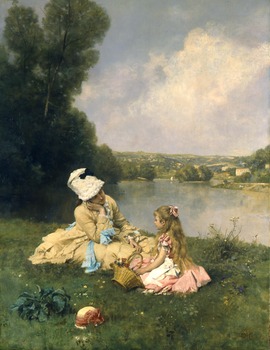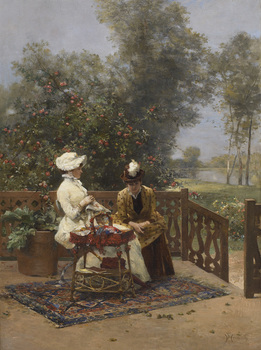Ferdinand Heilbuth
Ferdinand Heilbuth was born in Hamburg on June 27, 1826, the son of a rabbi. At a young age he moved to Munich to study, rapidly moving on to Antwerp, and then to Paris c. 1843-1846. Once in Paris, he studied under Marc-Gabriel-Charles Gleyre, a history and genre painter, and Paul Delaroche. His trips to Rome beginning in 1854-55, and later during the 1860s and early 1870s, inspired the much of his early work, which consisted primarily of genre scenes with Italian Cardinals. After leaving his homeland around the time of the Franco-Prussian War in 1870, Heilbuth never returned and became a naturalized French citizen in 1878. It was during this period in the 1870s that the artist shifted his focus away from the Italian themes that had previously occupied him, and began to create more modern Parisian subjects.
Heilbuth regularly submitted to the Paris Salon after 1852, and through these submissions sold many works to the State--works which are now housed in the Museé du Louvre and Musée d?Orsay. Highly recognized in his lifetime, Heilbuth was awarded medals in 1857, 1859, 1861, and was lastly decorated with the Légion d?honneur in 1861 and promoted to Officier in 1881. He worked within illustrious groups of French painters, participating in 1865 in an exclusive exhibition of the Cercle de l?union des arts on the rue Choiseul, along with Delacroix, Decamps, Diaz, Troyon, Meissonier, Ribot, Belly, Daubigny, Millet, and Gérôme. In addition to his success on the continent, Heilbuth also exhibited in London at the Royal Academy and at the Grovesnor Gallery (1871-1878).
Selected Museum Collections:
Musée d?Orsay and Musée du Louvre, Paris; Walters Art Museum, Baltimore; Musée des Beaux-Arts de Bordeaux; Wallace Collection, London; Musée Rolin, Autun; Musée Fournaise, Chatou; Château Musée de Nemours; Musée des Beaux-Arts de Reims; Hermitage, Saint Petersburg;




